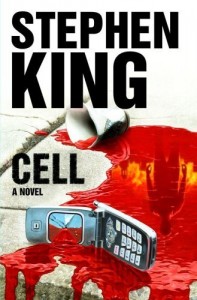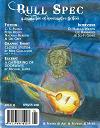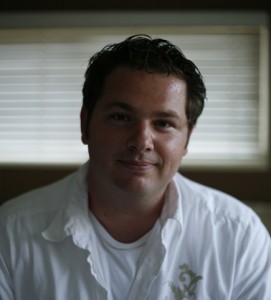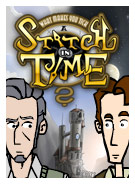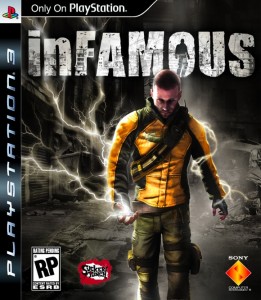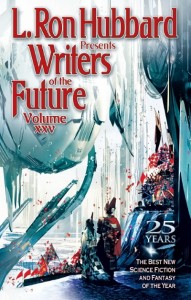 written by Frank Dutkiewicz
written by Frank Dutkiewicz
It is astounding that a contest set up for amateur writers in the very narrow genres of fantasy and science fiction still thrives after 25 years. I bought that first edition, and many others that followed. This contest has spawned the careers of many of the writers you will see gracing the shelves of your favorite bookstore today. I could spend the time listing them but this review isn’t about the writers of past, but of the future.
Garden of Tian Zi by Emery Huang. First place fourth quarter and grand prize winner.
Tian Zi harvests the skins of genetically altered frogs, a key ingredient needed for the processors in the computers of the time. He is a member of the ‘Movement’, an organization that seeks to undermine the megacorps that rule the world. He is set in an isolated village in the dissolved Peoples Republic of China to set up shop. He enlists the aid of a local beggar girl, Khulan. Tian Zi plays a dangerous game. Harvesting and selling his valuable peptides for the benefit of all of mankind does not fit the corporate goals in charge.
Garden of Tian Zi is an inventive sci-fi set in an intriguing world. A world without governments and technology that is fairly unique is the pull of this story. Tian Zi is revealed later to be far more then a bio-electronic technologists as the opening suggests. His character started out like Eddie Albert’s ‘Oliver’ in Green Acres and evolved into a James Bond/Steve Austin superhero by the end. Khulan is the teenager street rat that Tian Zi becomes attached to. I believe her character was created to bring out Tian Zi’s softer side and show that he is human and not an unemotional robot.
I found the story easy to get through but the premise hard to buy. I thought the Movement’s plan to have one person grow and sell the skins, in a public fruit stand in a busy market, to be needlessly risky. Why not sell the frogs to the competition if they’re after ending a monopoly instead? Many of the twists in the story are sprung on the reader as the story progresses. Coupled with the jumps in time, the twists have a jarring effect. The story is constantly changing and the plot becomes more fantastic with each scene. Khulan has little impact in the plot, IMO. She is there only to provide the MC depth but lacks it herself. To me her character wasn’t much more than wallpaper except for the ending when her safety becomes the real goal of Tian Zi.
Garden of Tian Zi is a head-scratcher to me. I found more to dislike about it than I did to like.
Grade C
The Shadow Man by Donald Mead. First place second quarter
Jito Ota is the shadow man. He collects atomic shadows, the silhouettes of the victims frozen on the walls of Hiroshima at the moment of the blast, for a museum in late 1950’s Japan. He is doing this for closure. Closure for Jito, who lost his mother that day, and for the victims locked in time. The horrible event of 1945 did more than destroy a city, effects that Jito has yet to discover.
The Shadow Man is a delightfully creepy tale. Jito’s has a gift of hearing the shadows on the walls, still reliving the final moments of their lives before the bomb detonated. Jito’s quest to bring this museum to life forced him to make a pact with a mobster, a pact he is hoping to sever for good. The idea for this story is first class, an original concept that is fitting a classic Twilight Zone episode.
I can see why this tale captured a first place award. I was thoroughly consumed with it as I read it. But like some movies that I sat on the edge of my seat in the threater, the luster of this piece dulled as I thought about it the next day. I wanted more of the shadows and less of Jito dealing with a gangster. Although the main antagonist in the climactic scene was well done, I did find Jito’s resolution to his problem predictable.
Another problem I had with it was the final scene. I really liked what Mr. Mead had in mind but the scene was too brief for it to work effectively (I won’t elaborate so not to spoil it for those who haven’t read it yet).
This story was on the way to a top grade, however the rushed ending felt too forced. Still a wonderful piece.
Grade B+
Life of Steam by Gra Linnaea. Third place second quarter
Mendel is an Inquisitor for the Dominican Order. His job is to determine if the Babbage machines of competing planets are just simple computation tools or abominations to god’s creation. The planet Wood has one that far exceeds the churches rules. Mendel is conflicted. Fulfilling the Dominicans directive means ending a miracle of life.
A universe where planets are flat islands of rock embedded in the firmament of the sphere of heaven? Spiderships powered by steam? An orthodox religion that holds sway over entire worlds? Life of Steam is as an original concept that I have ever read. I love this author’s imagination and the incorporation of a sci-fi element into such a fantastic fantasy.
I liked this MC and the dilemma that he is confronted with. A previous conflict in his past boosted this story up a notch for me. The ending and resolution came off as a predictable and a bit flat, however. I don’t know why but somehow it felt as if this story deserved more. High marks on originality.
Grade A-
The Assignment of Runner ETI by Fiona Lehn. Third place first quarter
Runner ETI runs for her charity, ‘End Terminal Illness’. She competes with other worthy causes for the yearly government gift. Because of an ongoing war, funds are limited, so only one charity is awarded the generous prize each year. With such high stakes the race has become one that is a matter of life or death.
If you take the blueprint from the movie Running Man, set it in a world where the environment is devastated from misuse, implant the contestants with some technological enhancements, and you have The Assignment of Runner ETI. The first half of the story had some edge of the seat moments. With assassins along a treacherous route, and a world where a dying nature is lashing out in anger, the race becomes a wild ride for the reader. However, like Running Man, the plot changed from a dangerous race with high stakes to a story about an oppressive government distracting the masses with the race. In other words, the fun went out of it for me.
Much like running in a real marathon, The Assignment of Runner ETI started off as an energetic and exciting endeavor only to become long and exhausting by its end.
Grade B
The Candy Store by Heather McDougal. Second place fourth quarter
John is the sheriff of a gold rush town that is slowly dying from dwindling strikes. Over night, a candy store opens in the abandon hardware store. Shaky Jay knows something ain’t right about it. Mrs. Limerick wants John to send the new owners away. The townspeople and miners can’t get enough of the candy, though. For it is filled with something far more sweeter than sugar. John’s wife, Maddy, has an idea what makes the candy special. Protecting the people is the role of a sheriff, but how can an honest working candy merchant be a threat to anyone?
The Candy Store is slow developing. It took me a good while to realize that it wasn’t an alternate history I was reading but a fantasy. The characters are rich and John makes a swell MC. The magic in the story I found intriguing. But, I thought the story got thinner and predictable as it went along. I wasn’t quite sure what happened at the end.
Many of the characters in The Candy Store were written like old western support characters, moseying along about their day. The story flowed the same way for me. Consistent, just not very exciting.
Grade C+
Risqueman by Mike Wood. Second place second quarter.
Jenkin Morgan’s love of his life, Leonie Fenech, has created an algorithm that is destined to benefit mankind. Risqueman is a self-learning mathematical formula that determines an individuals risk assessment, a boost for insurance companies. The government buys the company that employs Leonie and assumes control of Risqueman. Leonie warns that selling the algorithm, instead of providing it for free to everyone, will have dire consequences for the entire world.
Stories that involve a mathematician as a hero, and an equation as a premise, are rare but fun, for someone like me. I didn’t find Risqueman all that fun, I’m afraid. The MC was a delightful character but the story was more about Leonie. She came off as a high-minded liberal, brilliant yet narrow in focus. So sure of her own clarity that she believes everything she thinks is a universal truth. Not very likeable at all. (reviewer note: I find high-minded conservatives just as detestable). The two flashbacks in the first half I found particularly jarring. Trying to piece together what was going on with Leonie was a struggle as well. I found the entire premise to this story to be a real stretch. Much of it depended on flimsy economical system as well as a government that was blind of the events unfolding, and of the cause and effect relation, to do anything about it.
The first half of Risqueman was not enjoyable for me. Leonie and Jenkin’s past was just not that interesting. The second half did pick up, enough for me to think favorably of it.
Grade B-
Gray Queen Homecoming by Scohn M. Zackman. Third quarter third place.
Soliste Louzon and his AI mate, Alissa are all that makes up the crew of the starship ‘Wander of this Sea of Stars’. The travelers have returned to the Sol system, eager to see what has happened to Earth after all these years. The reception they receive is an icy one. They are instructed to an orbit around Saturn’s moon of Titan. The two people that board their ship have revealed much since they have been away. The Solar system has no place for Alissa’s kind, but needs Soliste for it to survive.
The real story of Gray Queen Homecoming is the delightful interaction between Soliste and Alissa. Their telepathic connection, and long life together, made for one very good ‘Odd Couple’ sci-fi angle. I found the relationship between the two believable and enticing. The author’s ability to provide information on what happened before in the middle of a conversation is first class. Although I really did like the relationship of the two main characters, the story itself wasn’t as grand. Without providing too much information, the betrayal I could see coming from a mile away.
Gray Queen Homecoming is a solid story. My only complaint about it is the ending didn’t live up to such a finely crafted piece.
Grade B+
The Dizzy Bridge by Krista Hoeppner Leahy. Fourth quarter third place.
Brindisi is a stone worker hired by a small town to construct a bridge. Although the community needs him, many see him as a demon. Little Lin does not. Brindisi enjoys the excited young boys company and discovers that Lin’s happiness is important to him. A new visitor arrives in the town, an illusionist with an extraordinary act as a bird. Lin is taken with the illusionist. Brindisi’s past makes him suspicious of the illusionist but puts it aside for the impressionable Lin. The little boy forces Brindisi to examine his own prejudice when things go badly for the bird lady.
The Dizzy Bridge‘s plot relies heavily on a world filled with magic. Brindisi’s own magical powers I found intriguing. His mismatched arms (one of metal, the other wood) and fingers of different consistency, I loved visualizing. His gift is finding stones that have different purposes, very complicated magic. The bird lady’s act seemed more than simple illusions to me. The story, I feel, didn’t develop like I would have liked. It all centered around the illusionist when a deeper one was there with Brindisi.
This story was based in a world where the parameters of magic were unclear. It appeared to me that anything was possible. I couldn’t get grounded in the setting and the story didn’t appeal to me. Too bad because I could see promise with its main character.
Grade C+
Gone Black by Matthew S Rotundo
Sergeant Manny Gutierres has the worst job on Hargas base. He has the classified duty of empting the latrine for the lone Walphin prisoner in human space. The Walphin are aquatic aliens that are just as comfortable on land as they are in the water. The Intell officer in charge of the prisoner is attempting to communicate with it. To Manny, the walphin isn’t looking so well. The base that has gone black for secrecy, information on what is going on in the rest of the galaxy is light, which makes the base ripe for wild rumors. Manny’s honor is leaving him conflicted and it was his honor that got him assigned to his duty in the first place. On a base sitting on a powder keg, will he know what is right thing to do when it counts?
Gone Black is the type of story that I would have gravitated to in my youth with its alien/human conflict as a backdrop and thick layers of tension among the military personal under the surface. I think the name of the alien species is clever. Learning how violent they were, with the artist depiction (Luke Eidenschink) of it, really helped this piece. Manny is as likeable as can be. His dilemma, along with his moral character, is the driving force of this story. His past lends much to it.
I think this story is first class. The ending isâ€unexpected. I contemplated lowering my grade a mark because of it, but upon reflection I have decided not to. It caught me off guard, which is usually a plus for me, and is consistent with what Mr Rotundo was building.
Grade A-
The Reflection of Memory by C L Holland
A nameless girl awakes in the cold snow with amnesia. Kestrin, in the shape of a jackdaw, finds her and brings her back to his family’s hold. It is strange that she has no name, for names mean everything. Kestrin’s family is concerned for her and seek the help of their uncle, Yaphen. The wise uncle, who seems to have answers before questions are asked, does not know what to make of the nameless girl. There is one place that may be able to help her. The nameless girl is scared to find the answer, and terrified of her reflection.
Who says a clichÃ�’ �d opening is doomed to fail? The majority of the story is about discovering the identity of the mysterious MC. Most of Kestrin’s family have a gift of magic and use it to help her. For such a noble-privileged family, it was odd they would expel so much effort into helping, what could be easily assumed to be, a peasant girl lost in a medieval society. There is a point in the story in which the MC has a challenge with her reflection. This part was done extremely well. However, the rest of the story dragged. It was long and read even longer. I couldn’t help to wonder if half of it was even needed.
Aside from the one dynamic scene, I thought this story crawled. The characters weren’t all that compelling and the interaction between them felt uncomfortable. I recommend picking a point in the middle to start. You won’t be missing much if you do and the story will be more enjoyable if you did.
Grade C
After the Final Sunset, Again by Jordan Lapp. First place third quarter.
With another sunrise, the Phoenix is reborn. The fabled bird assumes the form of a human, compelled to make the world a bit better. As it rises from its ashes, it draws upon the experiences of the people that live in its apartment building so it can form its own personality. At the moment of her rebirth, the man in an adjoining apartment dies. Feeling deaths touch has left the Phoenix in fear. Keenly aware that her time is short, she takes extraordinary steps to lengthen her life.
After the Final Sunset, Again takes an old idea and made it original. We get a clear view of a being that is meant to live a life that spans hours and is supposed to accomplish more than what mere humans can do in years. The Phoenix’s unfortunate experience of feeling another’s death has scarred her and gives her a perspective about life any person could sympathize with. For one who is supposed to die at sunset, it inhibits her destiny. Although the majority of the story centers around one character, the addition of Father Baytilus helped bring the message of the piece out. He is the “guardian angel for (mankinds) guardian angel”.
I could rave about this story all day. Mr Lapp has tapped into what makes the Sci-fi and fantasy genre great, delving into a deeper meaning of man through a character that isn’t human. I found this story unique, gripping, compelling, and moving. From the title to the ending I could find no fault with it.
Grade A+
The Farthest Born by Gary Kloster
Nathan will do anything for his family. On the colony of Far London, he takes them on picnics, plays baseball with them, and takes on a full grown Tavi to save his daughter, Lilly, life; all from the safe confines of a space station light years away. The parents of the children of the colony assume the bodies of androids while they raise Earth’s first interstellar settlers. The ability of the adoptive parents to reach across light years instantly allows them to protect their children from the harsh world. Lord help them if the link is ever severed.
The opening scene to The Farthest Born was one of the most dynamic beginnings that I have ever read. If Mr Kloster decided to end it there, this story would have been great as it was. But he took it to the next level and wrote something grand. The twin perspectives of Nathan and Lilly were done well. I can imagine a novel or a whole series of stories done on Far London.
I really liked this story. Job well done.
Grade A
The Art
I would like to acknowledge two artist’s interpretations of the stories they were assigned.
Luke Eidenschink’s rendition of Gone Black helped me visualize the alien. He took a moment within Mr. Rotundo’s story and brought it to life. It was done just as I imagined it and, I thought, was the point of the story that deserved to be drawn. Mr. Eidenschink may have raised the grade of Gone Black a notch or two for me.
Ryan Behrens account of Life in Steam was a masterpiece. The detail in the background, and look of pain on the main characters face, is something that I would have loved to see in full color. It was beautiful.
A Tale of Two Tales (and the authors that wrote them)
I happened to watch the awards last year live. Well, kinda. The stream over the poor quality, shared network I was stuck with gave me a jumpy screen with an audio that rarely matched the video. The ribbon dancers were still on my screen, while the voice of some guy from NASA talked about all the cool stuff that I couldn’t see. Fortunately, it got worked out in time for me to watch the authors as they were presented their heavy looking pyramid shaped prizes. Two authors stuck out above the rest in my memory of the event, mostly because how they embraced their moment in the light.
Emery Huang appeared to me as if bounty hunters had to drag him to LA. He looked every bit the part of an amateur writer that just won the biggest event of the year — nervous, humbled, and unsure if it all is just a dream, one he would be waking up from in any minute.
Jordan Lapp, on the other hand, I remembered as comfortable. Almost as if he knew this day was coming all along. He looked calm and confident. His speech sounded prepared and practiced. The event — a dress rehearsal for bigger and better things down the road.
The two authors put me in mind of rookie batters stepping up to the plate in the majors for the first time. Emery, the shaking kid that looks too nervous to be able to swing the bat. You watch him and wonder even if he manages to put the bat on the ball, will he trip over his own feet running to first? Jordan on the other hand†steps up to the batter box swinging three bats at once. Discards two of them over his shoulders as if they were cans of beer he just downed. Spits a cheek full of chaw at the ump’s feet. Gives the pitcher a knowing wink. And contemplates pointing to the outfield stands, just for the audacity of it. Even if he is playing for your team, you half want him to strike out, just to see the priceless look on his face.
As charming as Mr Huang — what am I doing here? — demeanor was, it didn’t change how I felt about his piece. Now I can’t remember my personal favorite ever winning the top prize. Last year’s winner for example, Ian McHugh’s Bitter Dreams (I misidentified the winner in my review), wasn’t my favorite, but all it took for me was to read the first two paragraphs of his story to see why it won. His elegant style was evident there, a rare display of natural talent that is so difficult to match. I did not see any such magic in the Garden of Tian Zi.
Now, I don’t think extraordinary prose should be the criteria for a winning story, nor am I saying Mr Huang’s writing is sub-par. In fact, I would be the first to admit that Emery’s ability to string two words together far exceeds mine, but as a reader, I just don’t get how this story beat out three solid tales.
If you were to take KD Wentworth’s advice, and follow a check list on how to write a winning story, then you could give Garden of Tian Zi a passing grade, but just barely.
Did the opening grab you? Hmmm. Sure.
Was the speculative element present in the first page? A future where corporations rule the world? Okay, I suppose there is.
Is the story an original and/or fresh concept? Let me think. Megacorp organizations? Bionic enhancements? Underground society undermining monopolies? Not so far. Package it all together and it just might be enough.
Is the protagonist likeable? Wow. Tough call. He ran away from his responsibilities. He abused a small street girl. But he is sacrificing all he could have had for the greater good, and he does care for the street girl. Guess he’s likeable enough.
Does the main character change by the end of the story? Can someone so flat change? By the strict definition of the question, the answer is yes. He does change.
Of course, my interpretation of Mr Huang’s tale may be too narrow. Others liked it. Mr Lapp said himself he felt it was the best story, in the best WOTF anthology ever. If this was only a matter of plot, characters, setting, and prose that I didn’t find inspiring, I wouldn’t be questioning the judges’ decision. What I can’t understand is how a group of professional writers — about half of which works I have religiously followed — would pick a piece whose storyline changed with every scene.
The shifting scenes in Garden of Tian Zi are jarring. Instead of bridges that connect the reader to each scene, there are wide chasms that the reader must leap. In every new scene, a new element to the main characters predicament is sprung on the reader and the MC is granted these sudden incredible abilities to help him deal with these fresh dangers. We have changes in politics, strategies, contacts, friends, and foesâ€the story goes from something fantastic to something fan-TAS-tic. I liken the reading experience to playing a new board game and the person teaching you the game introduces new rules as you play. Difficult to get grounded.
Jordan Lapp, and his story, is as different to Emery Huang’s, and his work, as you can get. Investigating the two writers, and what they have been up to, revealed that Mr Huang just about disappeared from the face of the Earth. No further interviews (none that I found), no announcements of follow up work. No advice, news, blogs; nothing. Jordan however, has not been sitting still.
On his one-on-one interview at the award ceremony, Jordan eluded that the WotF prize was a step to help further his career, and he must have meant career with a capital C. Not only has he done an interview for Diabolical Plots, he has done them for podcasts, Innsmouth free press, Sirius/XM’s book radio (sorry I missed that one), and likely other outlets that I have yet to discover. His twitter blog, Without Really Trying (interesting name for it) is growing in followers (well, I just joined so it has grown by at least one). His online magazine, Every Day Fiction, has been gaining in popularity, at least it has with the small circles of writers that I know. Reading and watching his opinions on writing, the industry, and his own success does leave an impression.
Mr Lapp may be surprised that more than a few do pay attention to winners of the Writers of the Future contest. If you can take his own estimates that as many as 1800 submissions make it to KDW’s desk every quarter, you can see why so many are eager to find the secret formula to writing a winning entry. Some of what he has said has raised an eyebrow or two. A close friend of mine remarked that he (let me put this kindly) is guilty of pride. I can see why another writer would think that when Jordan declared that the 25 year anthology, he won first in, was “the best ever” (I disagree, BTW. I thought issue 24 was better but the final two stories made it close).
I want everyone to know that I am not writing this to assassinate Jordan Lapp’s character, nor do I find anything wrong with his promotion of WotF vol XXV and his own works, but my first impression of him and his opinions did leave a strike in my not-so-sub-conscience. I never want to go into a story not wanting to like it, but I must admit a small part of me wouldn’t have been disappointed if Mr Lapp’s self-assured confidence went down swinging. Just like a cocky rookie stepping up to the plate for the first time, he hit it out of the park with his first swing.
Last year I gave one story my highest grade (Crown of Thorns by Sonia Helbig). Between the two, After the Final Sunset, Again beats it hands down. It is the type of story that I found inspiring, the type of inspiration that first time writers leave a mark on their readers, just as another new time writer did with a novella called Ender’s Game decades ago. Although After the Final Sunset, Again failed to win the top prize in the Writers of the Future contest, I do believe that it is good enough that it should be considered for others.
So in the unlikely event that anyone with the pull (and the patience to read through this entire post) to award a lesser-known writer the honor, I recommend that they give Jordan Lapp’s story a good look. After the Final Sunset, Again is deserving a Hugo nomination. It might kill me to see this rookie hit it out of the park, again, with his second swing, but when a kid’s got it, you have to acknowledge when you see it.
 Frank has been lurking around publishers, writers, and bloggers long enough that a few have decided to give him stuff to do, just to get him out of their hair. Frank’s needling has earned him publications in Atomjack, Alienskin, Twisted Tongue, Space squid, Flash Me, and Goldenvision magazines, as well as a story in the Oz anthology Shadows of the Emerald City. He also has stories set to debut in Strange, Weird, and Wonderful and On The Premises this summer, unless the editors change their minds. Aside from writing, Frank’s other life goal is to become a World-class professional Tic-Tac-Toe champion. His current record is two wins, one loss, and 17,685 ties.
Frank has been lurking around publishers, writers, and bloggers long enough that a few have decided to give him stuff to do, just to get him out of their hair. Frank’s needling has earned him publications in Atomjack, Alienskin, Twisted Tongue, Space squid, Flash Me, and Goldenvision magazines, as well as a story in the Oz anthology Shadows of the Emerald City. He also has stories set to debut in Strange, Weird, and Wonderful and On The Premises this summer, unless the editors change their minds. Aside from writing, Frank’s other life goal is to become a World-class professional Tic-Tac-Toe champion. His current record is two wins, one loss, and 17,685 ties.
 M.E. (Michael) Ray is the editor of upcoming pro-paying publication Redstone Science Fiction. Keep your eye on this one: it has all the makings of a SFWA-approved market as long as they meet the longevity requirements, and if that happens, all the sales from the beginning of the magazine will be retroactively counted as SFWA-approved. (For those of you don’t know, SFWA is the Science Fiction and Fantasy Writers of America, a professional organization which requires a certain number of professional sales to become a member). Redstone opened for submissions in mid-March, and quickly got their first 200 submissions, closing the floodgate again in early April. Now they’re busy reading through the submissions and making their decisions in anticipation of the anticipated publication date of their premier issue: June 1st. They expect to open for submissions about the same time.
M.E. (Michael) Ray is the editor of upcoming pro-paying publication Redstone Science Fiction. Keep your eye on this one: it has all the makings of a SFWA-approved market as long as they meet the longevity requirements, and if that happens, all the sales from the beginning of the magazine will be retroactively counted as SFWA-approved. (For those of you don’t know, SFWA is the Science Fiction and Fantasy Writers of America, a professional organization which requires a certain number of professional sales to become a member). Redstone opened for submissions in mid-March, and quickly got their first 200 submissions, closing the floodgate again in early April. Now they’re busy reading through the submissions and making their decisions in anticipation of the anticipated publication date of their premier issue: June 1st. They expect to open for submissions about the same time.

